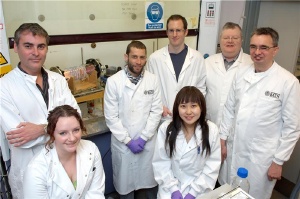Mar 19 2009
Researchers at the University of Bath are to be part of a €3 million Europe-wide research collaboration to pioneer research into safer, more effective anti-bacterial plastics and coatings that can be used in items such as food packaging, medical devices to wound dressings, and nappies.
 Bath research team (back, left to right): Dr Nick Waterfield; Xavier Munoz; Neil Poulter; Dr Gareth Price (HoD); Dr Toby Jenkins. Front: Charlotte Brown and Jin Zhou.
Bath research team (back, left to right): Dr Nick Waterfield; Xavier Munoz; Neil Poulter; Dr Gareth Price (HoD); Dr Toby Jenkins. Front: Charlotte Brown and Jin Zhou.
The Bath team has developed a range of new compounds which have been shown to be highly effective against common hospital bacterial infections such as MRSA and are safer than existing anti-bacterials based on silver nanoparticles.
They will develop these compounds so they can be cheaply and efficiently incorporated into a wide range of materials from medical devices, wound dressings, food packaging and even nappies.
Led by Dr Toby Jenkins at the University of Bath, the research team comprises chemists Dr Andrew Johnson and Dr Gareth Price, and biologist Dr Nick Waterfield as well as colleagues in Barcelona, Exeter, St. Gallen (Switzerland), Mainz and Cologne (both Germany).
From the total grant, Bath will receive just less than three quarters of a million Euros, which will fund equipment and a team of three PhD students and a Research Fellow.
So-called “superbug” bacteria such as MRSA are dangerous because they are resistant to most conventional antibiotics, a problem that is getting worse each year.
To try and understand this problem, the researchers will also be studying which genes allow bacteria to become resistant.
Dr Jenkins said: “In simple terms, we want to know what is special about that one bacterium in a million that is resistant to an antimicrobial polymer. Which genes are switched on or off and which proteins are produced to help the bacterium survive?
“From this knowledge we can stay one step ahead of evolution in the fight against pathogenic bacteria and infections such as MRSA and Pseudomonas aeruginosa.”
Early work by the University of Bath team has made new compounds containing zinc, copper and silver which have been effective against common hospital bacteria but are non-toxic to human cell growth.